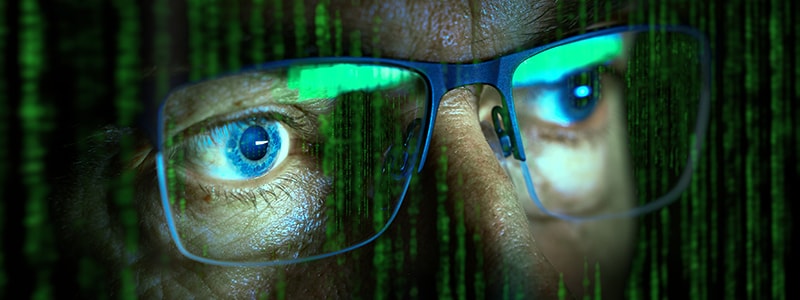Can cybercriminals spy on you through your webcam?
Webcams are great to stay connected with friends and loved ones but are they secure?

You might have heard that cybercriminals can access your webcam. In the age of connectivity, that’s a pretty scary notion. Not only might cybercriminals be looking through the webcam on your computer, but they may also be able to access your microphone and listen to your most private conversations.
Think about it — how far are you from a camera right now? Just about every PC has a camera on it these days. So how can you help protect yourself against cybercriminals?
What are the risks of webcams?
Webcams helped revolutionise how we stay in touch with friends and family, but they also pose risks of people accessing them and spying on you so it’s important to be aware of webcam security.
How Cybercriminals attack webcams
Cybercriminals can use so-called Trojan horse malware. You click on an attachment or download a piece of music or video infected with malware, and hey presto! – A cybercriminal can remotely control your PC’s functions – including your camera and microphone and may even be able to record images and audio remotely.
Is covering my webcam with sticky take enough?
One of the easiest solutions is covering you PC webcam with a piece of sticky tape but this may not be enough to fully protect your privacy. You may find your camera lens being damaged as you repeatedly must remove and reapply to your webcam. Simply covering your camera lens will also not prevent cybercriminals from accessing your microphone.
How to protect my webcam from cybercriminals?
Fortunately, you can take steps to help ensure webcam safety. Here’s some tips from our Norton experts:
- Never click on suspicious attachments. You’ve heard it before, but too often we click without thinking. Email attachments remain a prime source for malware. Be wary of those supposedly funny emails forwarded by friends and family. You should also avoid suspicious sites offering free downloads of music, TV shows or videos.
- Use a firewall. Firewalls can provide a measure of protection against unwanted traffic. Your computer comes with a firewall, but you also need to make sure it’s turned on at all times.
- Use strong and reputable security software. Install a security suite that offers more than just antivirus, malware and spyware protection, then make sure you keep it up to date!
- Don’t keep PCs with webcams in bedrooms. Limit webcam use to high-traffic areas and remind family members not to do anything in front of a webcam they wouldn’t want the world to see. It’s also a good idea to unplug your webcam when not in use.
- Secure your wireless connection. Make sure your wireless connection is protected with a unique password (not the default one that came with the router).
- Don’t talk to strangers. Avoid IM conversations with people you don’t know and advise your kids to do the same.
- Do be cautious about accepting tech help. Would-be cybercriminals have been known to ingratiate themselves with acquaintances by offering computer support help. But that gives them the chance to rig webcams so they can spy on the computer user. Avoid unexpected phone calls, emails or communications purporting to be highlighting a security problem on your device.
- Do look for the indicator light. On external webcams, you’ll usually see a red light indicating the camera is on. Laptops with internal webcams usually have a blue LED indicator. If you use an external webcam, simply detach it from the USB port when it’s not in use.
While it’s important to keep these tips in mind, there is a solution to better protect yourself from webcam intrusions and many other online threats to your privacy that exist today.
Norton 360 is an all-in-one security solution that provides powerful layers of protection for your devices and online privacy. Cyberthreats have evolved in today’s connected world. It’s no longer just viruses that can infect your desktop PC anymore, but everchanging cyberthreats that can put your online privacy as well as your private and financial information on your devices at risk. That’s why Norton is evolving, too.
With Norton 360, you get real-time protection for your PC, Mac®, iOS or Android™ devices against viruses, phishing and other cyberthreats. Plus, Norton Secure VPN adds bank-grade encryption to help secure the information you send and receive on Wi-Fi connections and helps prevent companies from tracking your online activities or locations. Norton Password Manager provides the tools you need to generate and store all your passwords, credit card information and other information online. Norton Cloud Backup for PC helps store important files more securely ‒ from documents and family photos to financial data ‒ as a preventive measure against the loss of data due to hard drive failures, stolen devices and even ransomware.
Norton 360 also comes with Norton Safecam for PC which alerts and helps you block cybercriminals from accessing your webcam without your consent. You can decide which programs you want to access your webcam and give you the option to allow or block unauthorised attempts.
With this range of tools at your disposal you can now bank, shop and browse online with more confidence that your devices, personal information, passwords and PC webcam have protection from cybercriminals.
Editorial note: Our articles provide educational information for you. Our offerings may not cover or protect against every type of crime, fraud, or threat we write about. Our goal is to increase awareness about Cyber Safety. Please review complete Terms during enrollment or setup. Remember that no one can prevent all identity theft or cybercrime, and that LifeLock does not monitor all transactions at all businesses. The Norton and LifeLock brands are part of Gen Digital Inc.




Want more?
Follow us for all the latest news, tips, and updates.